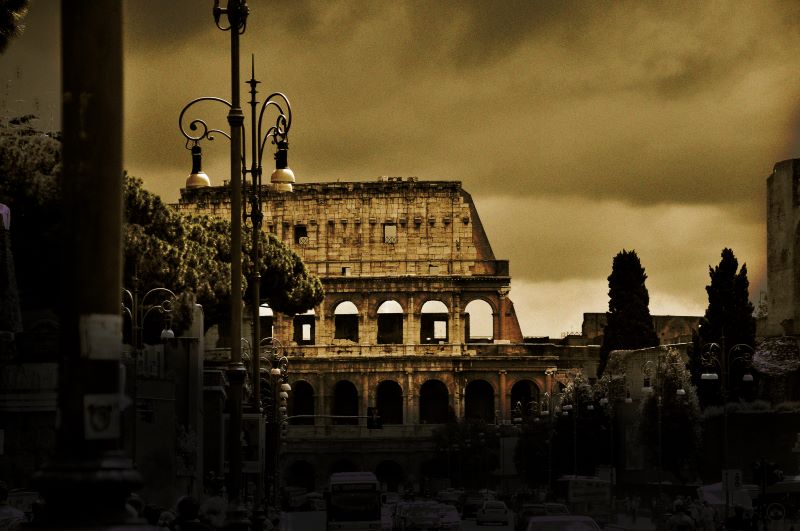The Destroyer Retaliates
Sign up for a six month free
trial of The Stand Magazine!
The lies of hell are numerous and varied, and whether they are entrenched in a human heart or a human culture they are difficult to uproot. But Christians are called to tear down these strongholds using the light of God’s word to do so.
This does not go over well with those who embrace the ideologies – pagan, religious or secular – that serve as the foundations of their lives.
What does the New Testament say Christians will experience when retaliation comes?
Persistent pursuit
The word that would most naturally come to mind in describing this retaliation would be persecution. The word itself literally means to drive someone away or pursue someone with the intent to harass, harm or injure.
One of the most prominent biblical examples involves Saul of Tarsus – who later became the Apostle Paul – and his terrible pogrom against the early church. In Acts 8:1 it states: “And on that day a great persecution began against the church in Jerusalem, and they were all scattered.” One translation says it was a “cruel persecution.”
But this wasn’t a one-time eruption of anger against the preaching of the gospel, such as what happened at Ephesus in Acts 19. Saul’s persecution involved a persistent pursuit of his enemies.
“Saul began ravaging the church, entering house after house, and dragging off men and women, he would put them in prison” (Acts 8:3). Then the zealous young man went to Damascus with the intent of ferreting out the Christians in that city. We all know how that ended (Acts 9).
In fact the Book of Acts is filled with examples of such persecution as Jewish leaders pursued Paul and other church leaders from city to city, apparently in an attempt to exterminate the nascent religion.
Falling blows
However, in the New Testament there appear to be a number of things that would fall into the category of retaliation that we would label persecution.
In passages like Matthew 5:10-12, Jesus warns His followers that persecution will be part of the Christian life. Here He uses the word persecute three times and adds two additional blows aimed at believers: insults and lies (“falsely say all kinds of evil against you”).
Merriam-Webster says to insult means “to treat with insolence, indignity or contempt,” and the lies that are told against Christians encompass evil slanders and accusations (Acts 6:11).
The third use of the word persecute in Matthew 5 actually seems to include insults and lies.
In Hebrews 10:32-34, while the word persecution is not used, the “great conflict of sufferings” apparently resulted from a local outbreak of persecution. The word sufferings refers to something real: It is distress, sorrow, grief and pain. In Greek culture, it referred to the unrelenting misfortune that was experienced in life and had to be endured. There was no escaping it.
The origin of these sufferings was partly due to the Christians “being made a public spectacle through reproaches and tribulations.” The word spectacle refers to something that is put on exhibition for people to find interesting or entertaining, or as “an object of curiosity or contempt,” according to the Louw-Nida Greek Lexicon. In fact, the English word theater comes from this Greek word.
But this passage has nothing to do with portraying Christians as goofballs in the local amphitheater. What was happening to Christians was meant to be a public exhibition for the purpose of shaming. (This seems to explain the interest of some in Hollywood who portray Christians as nutcases, self-righteous prudes or ax murderers.)
The public scorn came through the instrumentality of “reproaches and tribulations.” This reproach refers to the insults and censuring of Christians in an effort to discredit them and their beliefs.
The word tribulation means to rub, giving expression to the dragging and crushing process used in threshing grain. One form of the word referred to a small, tight or narrow place, and so it also came to symbolize the cornering of a person so that he cannot escape distress. Some of these Christians were imprisoned and their property seized.
In the Book of Acts, enemies of the gospel would often pursue Christians (Acts 17:13) and incite the locals, even gathering “wicked men from the market place” as ground troops to attack believers (vs. 5). Sometimes Christians were driven out of the city by angry mobs (Acts 13:50), other times they were stoned and left for dead (Acts 14:7).
At times government officials would participate in the persecution (Acts 14:5), while at other times they would do nothing to either aid or stop it (Acts 18:12-17). Jesus promised His followers that government agencies would sometimes be instruments of retaliation, “for they will deliver you to the courts, and … you will stand before governors and kings” (Mark 13:9).
In some circumstances, of course, Christians would be martyred – Jesus said, “they will put some of you to death” (Luke 21:16; Matthew 24:9).
The titanic battle
According to Jesus in Matthew 5:10-12, the trigger for persecution is identification with Christ in the living of a righteous life. But this is not a vague, generalized religiosity; it is the righteousness of a radical life that manifests the living God. Christians will be hated because they bear the name of Jesus (Matthew 24: 9) – but why do people hate Jesus? Who can argue with a message of love from God to mankind?
The love of God is manifested by the cross, and the cross is foolishness and a stumbling block (1 Corinthians 1:23) precisely because it lays waste to everything the unregenerate person thinks he knows about reality. Our goodness is rejected as filthy garments; our idols are revealed to be corrupt expressions of a demonic hegemony; our autonomy is uncovered as a sham; our most prized ideas of human glory are identified as symptoms of a wicked rebellion.
Human pride does not welcome such painful realities, and in fact, Jesus said “men loved the darkness rather than the Light, for their deeds were evil. For everyone who does evil hates the Light, and does not come to the Light for fear that his deeds will be exposed” (John 3:19-20).
The titanic battle that ensues between the Light and darkness causes a monumental spiritual crisis – whether it is happening in one lone heart or an entire culture. This is why Christ said He came to bring a sword that would shatter familial ties. Even the closest family relationships would break under the strain (Matthew 10:21, 35-36).
Jesus Christ has declared war on every form of darkness, and the landing of the Son of God on earth planted a heavenly flag on enemy soil. That act – carried forward into every corner and crevice of the earth by the church – demands a decision. Choose your side. The old way must yield to the Kingship of Jesus Christ – now or later, for every knee shall bow (Philippians 2:10).
For those who repent and bow before Christ, they will enter the new reality – the kingdom of heaven. For those who refuse, the very boldness of the demand often triggers a massive and violent response. Christians who boldly live for Jesus and proclaim His name become the earthly targets for those demonic principalities and powers who fear that their petty kingdoms will be uprooted and hurled into the Abyss.
So yes, Christians who go faithfully into the darkness carrying the lamp of the light of God will be afflicted with trials, but they will not be crushed. They will sometimes find themselves bewildered, but God will not allow them to despair. They will often be battered and knocked down, but they will not be destroyed. And they will be persecuted, but the Lord will not forsake them (2 Corinthians 4:8-9).
The world is filled with unbelievers trapped in darkness, who are being led away to spiritual slaughter. The only ones who can save them are those who, in obedience to Jesus Christ, are willing to die in the attempted rescue.
They’re called Christians.
(This article originated from the AFA Journal.)

Sign up for a free six-month trial of
The Stand Magazine!
Sign up for free to receive notable blogs delivered to your email weekly.


















